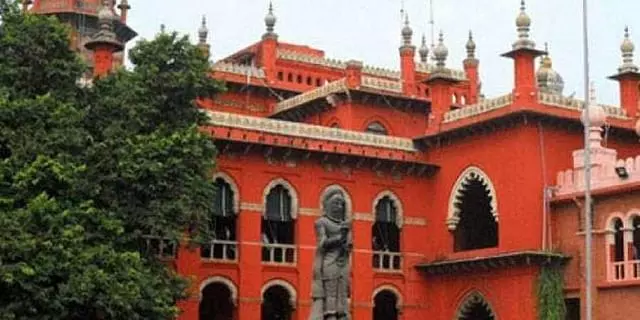
Case, raids on Tasmac were no fishing expedition, ED tells Madras HC
In detailed counter-affidavit, ED defends raids, asserts compliance with legal protocols, dismissing Tasmac's claims of harassment; final hearing on April 8

The Madras High Court has adjourned the hearing of two writ petitions filed by the Tamil Nadu State Marketing Corporation Ltd. (Tasmac) against the Directorate of Enforcement (ED) to April 8, 2025, for a final hearing.
The state government had filed the petitions challenging the legality of search and seizure operations conducted by the ED under the Prevention of Money Laundering Act (PMLA) from March 6 to March 8, 2025, at Tasmac's Chennai headquarters.
The ED has claimed that it has unearthed evidence for a Rs 1,000 liquor scam from private distilleries and bottlers.
ED defends actions
In a detailed counter-affidavit, the ED has robustly defended its actions, asserting compliance with legal protocols and dismissing Tasmac's claims of harassment and procedural violations. The case has drawn attention due to its implications for public accountability and the fight against financial crimes in Tamil Nadu.
Also read: ED ‘unravels’ Rs 1,000-crore liquor scam in TN, confirms The Federal story
Tasmac, the state-owned liquor retail organisation, sought a declaration that the ED’s actions were “without jurisdiction, illegal, and arbitrary” and a mandamus to prevent alleged harassment of its officials.
The ED’s counter, filed by Assistant Director Vikas Kumar, presents a point-by-point rebuttal, arguing that the petitions are premature and are an attempt to derail a legitimate investigation into money laundering linked to alleged corruption within Tasmac.
ED challenges petition maintainability
The ED has argued that Tasmac bypassed statutory remedies under the PMLA, such as approaching the adjudicating authority before invoking the High Court’s extraordinary jurisdiction under Article 226.
“The petitioner has alternative remedies under the PMLA framework, which should be exhausted first,” the counter states, urging the court to dismiss the pleas outright.
The enforcement agency has justified its search operations, conducted under Section 17 of the PMLA, citing credible intelligence and multiple FIRs registered by the Directorate of Vigilance and Anti-Corruption (DVAC). These FIRs allege widespread corruption within Tasmac, including unaccounted cash found during surprise checks, bribes collected by senior officials for favourable postings, and illicit payments from breweries.
“The investigation targets scheduled offenses under the Prevention of Corruption Act, 1988, which fall squarely within PMLA’s ambit,” the ED asserts, refuting TASMAC’s claim that the Tamil Nadu Prohibition Act, 1937, was the basis.
ED says it complied with due procedures
The counter details that the searches, authorised on March 5 by the Joint Director of ED’s Chennai Zone-I, were backed by documented “reasons to believe” money laundering evidence existed on Tasmac's premises.
These reasons, kept confidential to protect the probe, were shown to officials like District Revenue Officer Ramadurai Murugan, who signed the authorisation, the agency said.
The ED has also denied Tasmac's claim that copies of the search warrant weren’t provided, stating that legal norms only require its presentation, not distribution.
Also read: ‘Exceeded authority’: TN govt challenges ED’s Tasmac probe in Madras HC
Agency dismisses claim
Tasmac's allegations of a gruelling 60-hour search and illegal detention have been dismissed as “factually incorrect” by the agency.
The ED has clarified that the search began at 1.55 pm on March 6 and concluded at 11.40 pm on March 8, with breaks for rest and meals. “No female staff were forced to stay overnight, and Shri M Jothi Shankar was allowed to leave due to his cardiac condition,” the affidavit notes, supported by the panchnama signed by independent witnesses.
The ED has also refuted claims of coercion in recording statements, emphasising their voluntary nature under oath, as witnessed by panchas (witness). It said that sessions lasted no more than 2.5 hours, with amenities provided.
On digital evidence, the seizure of mobile phones and data extraction from officials like MD Visakan and GM Sangeetha was lawful and were conducted by forensic experts with hash values ensuring integrity, per Section 17(1)(ii) of PMLA.
‘ECIR not an FIR’
Tasmac's grievance over not receiving the Enforcement Case Information Report (ECIR) has been brushed aside, with the ED citing the Supreme Court’s Vijay Madanlal Choudhary (2022) ruling that ECIR is an internal document, not equivalent to an FIR.
“Grounds of arrest suffice under Article 22(1),” Kumar states, adding that privacy and speech rights, raised by TASMAC, are subject to reasonable restrictions like crime detection, as upheld in KS Puttaswamy (2017).
Also read: Tasmac 'scandal': TN minister Senthil Balaji denies allegations, says will fight legally
Labelling the search as a “fishing expedition” is baseless, the ED has said, asserting it was a targeted effort to unearth money laundering evidence tied to corruption. Seized documents, including tender records, are crucial to tracing the proceeds of crime, it says.
The ED has also underscored the public interest in the case, noting Tasmac's role in handling substantial public funds. “This probe protects revenue, ensures transparency, and deters corruption,” the counter argues, highlighting money laundering’s threat to the nation’s fabric.
What next?
In a parallel development, the court also admitted a petition by one Muralidharan, ordering the respondents to file a written reply, hinting at a broader scrutiny of enforcement actions in Tamil Nadu.
With the court setting March 8 for the final hearing, the case pits Tasmac's claims of overreach against the ED’s defence of lawful action.
Legal experts anticipate a ruling that could clarify PMLA enforcement boundaries and corporate accountability in Tamil Nadu.

